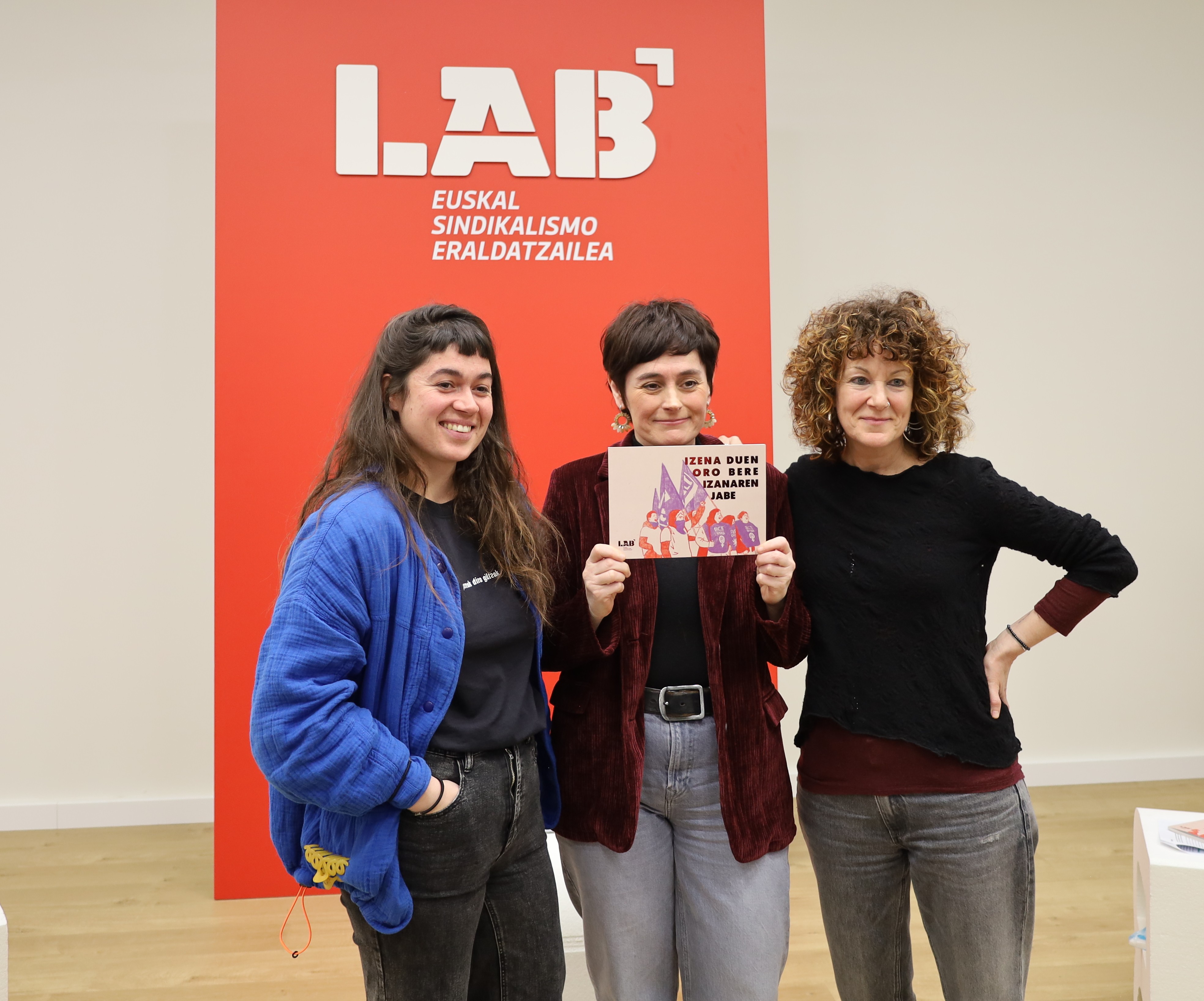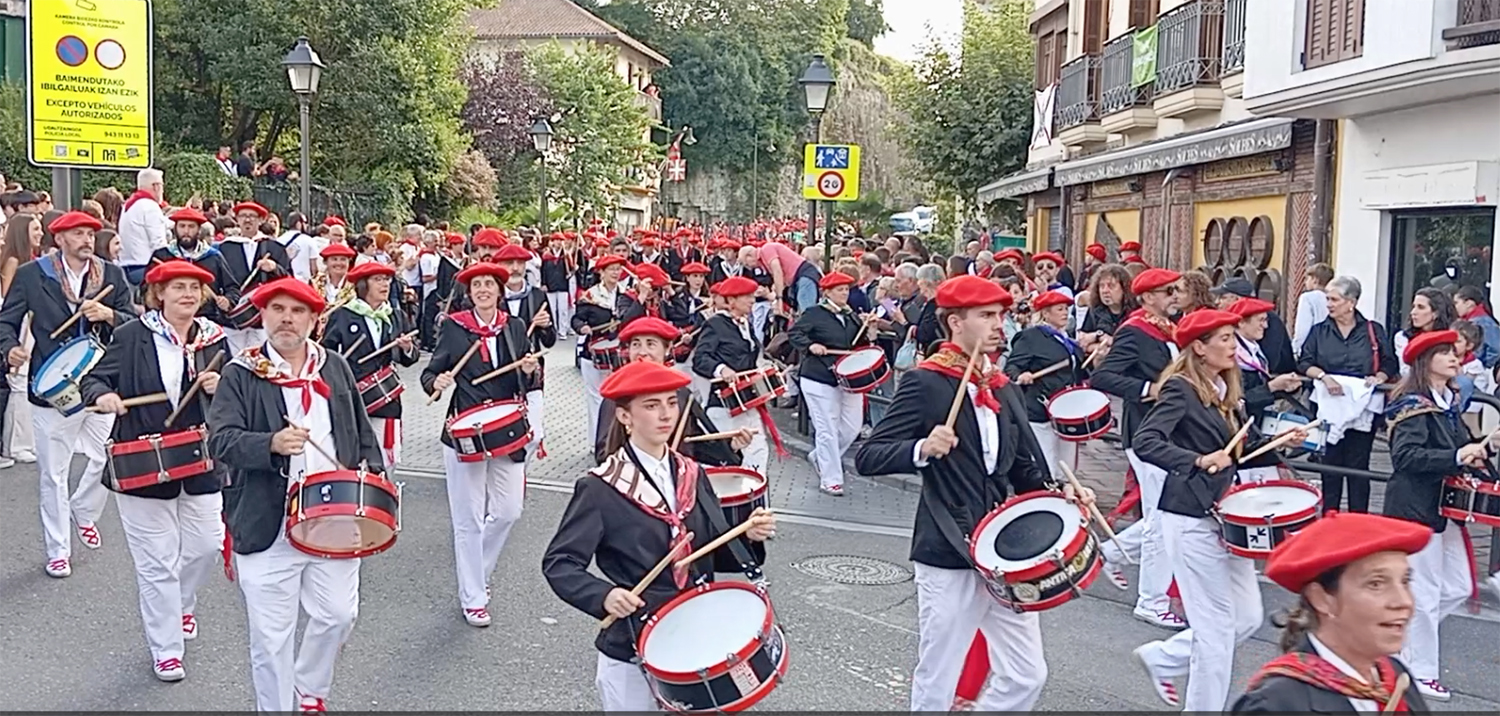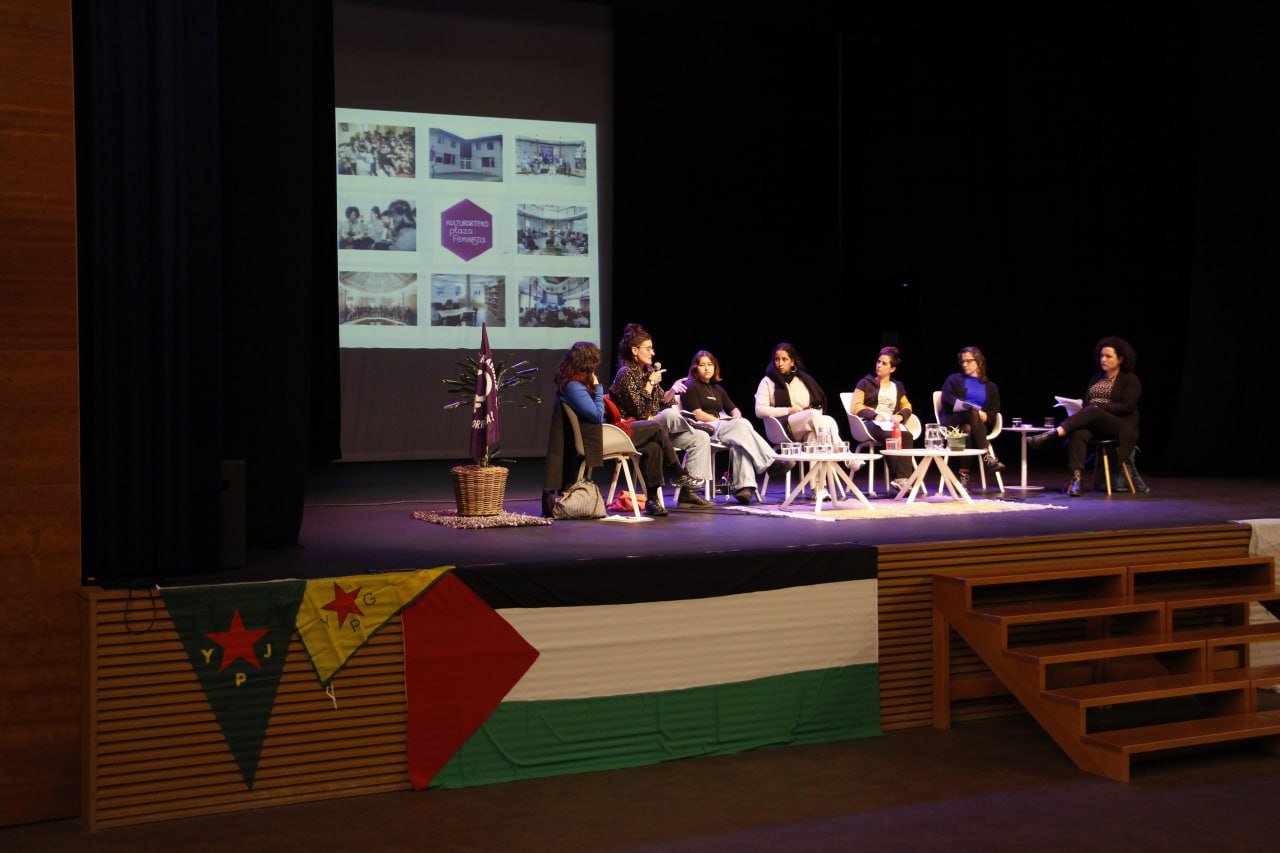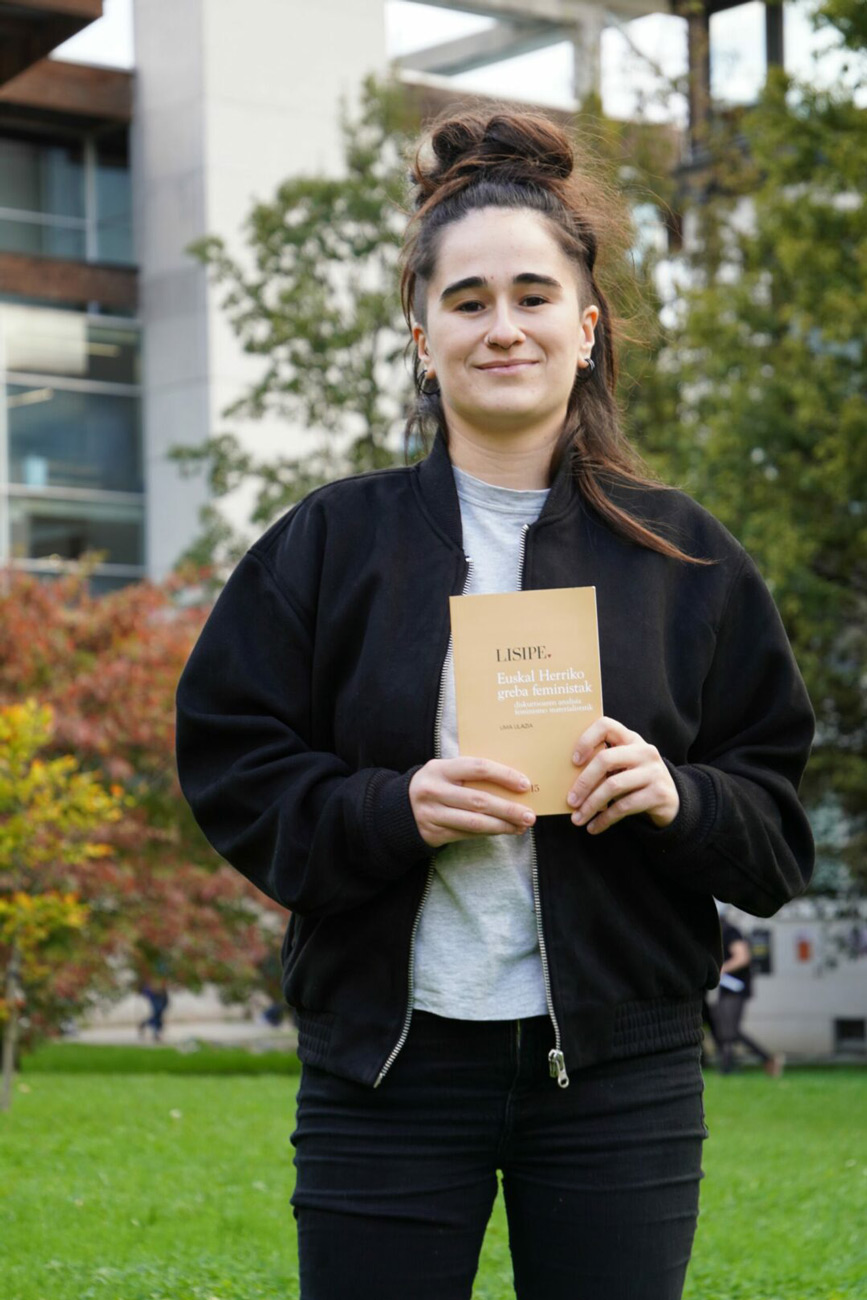"On 8 March we marked it as a turning point in the long process of transformation of the surveillance system"
- Everybody's lives in the middle. The feminist movement of Euskal Herria is heading today, March 8, today, under the motto "Caring to change what has been turned on". On the road to the revolution of the surveillance system, a long-term process begins today. ARGIA spoke with Ainhoa Olaso Sopela and Amaiur Egurrola of the feminist movement with the intention of knowing the nundik-norariak.

The Feminist Coordinator of the Basque Country, Herria Bizitzak Erdigunea, established it during the COVID19 lockdown. It's been three years. What is the dynamic of the group? How do you organize yourself?
A. Egurrola: The coordinator emerged in Pandemia, among feminist spaces. We have landed the process for a year: the days we held in February last year in Vitoria-Gasteiz are an example of this, or the multitudinous provincial assemblies organized this course. Now, the content received from the coodinator is being worked on by the Feminist Movement of the Basque Country. Recently, the Lives of All process has been made public to the Center and is organizing itself from town to town, from neighborhood to neighborhood, with guarantees of coordination at the level of the Basque Country.
Why have you felt the need to launch this collective process and recover public spaces?
A. Egurrola: We concluded that at the Feminist Conference of the Basque Country held in Durango the feminist movement needed a shared agenda. In addition, the problem of care and the struggle for decent lives focused on the center. Since then we could say that we have had to build that agenda in a broad way.
A. Olaso: Together with Pandemia, everything we claimed and theorized earlier became even more evident: the patriarchal root of capitalism appeared to us completely naked. On the other hand, the impact of the pandemic has been notable in the feminist movement, which has led, among other things, to despair, difficulties in reactivation and loss of connection with the movement. This process seems to us more than ever necessary to work for decent living conditions for Basque citizenship, and the dynamic has started from the feminist struggle. To do this, it has become essential that this process is carried out collectively, that decisions are made in the broadest possible spaces and that street recovery approaches are put in place.
It will be a territorial and collective process. Can you present us with important steps or elements within the agenda?
A. Egurrola: In February of last year we met in Vitoria-Gasteiz to bring together dozens of collectives from the Feminist Movement of the Basque Country, different areas and corners of the Basque Country. It contains a dossier containing content, demands and proposals for action plans. At the beginning of this course we have begun to share this action plan by provinces and to take decisions gradually. We have organized around countries, working groups have been set up, expanding regional participation spaces. The broad assemblies of peoples come together and we have set up a coordination table to try to maintain and coordinate them.
A. Olaso: On 1 February we made the process public. Since then we have launched a web with different content and tools for fighting. On the eve of 8 March, we have invited the process to land in the assemblies of towns and neighborhoods, and this is what is happening in most cases. Today, 8 March, we mark it as a turning point in this long process, which we focus on in the medium term. Until then, despite the fact that we have begun to move, expand, socialize and complement demands and struggles, from then on more work will come: the lever to build the Basque public and community surveillance system.
They say that "we are committed to a collective right to care. In favour of the right of all persons to provide and receive life-long care under conditions of freedom, dignity and commitment. This goes far beyond the situation of dependence." What are the conditions to guide surveillance as a "collective right"?
A. Egurrola: To the extent that it is a collective right, responsibility should also be so. The role of the institutions will be central to action. On the one hand, to have the right to fair care, decent material resources should be guaranteed, regularization of the migrated people, the right to housing, decent working conditions, time of care... On the other hand, we demand the adoption of measures to de-commodify and unfamiliarize care. Moreover, to the extent that care is feminized, men must also assume their responsibility. The community has an important responsibility in all of this. Besides doing different pedagogy and interpellations, it will be the direct basis for building liberating life models. In addition, accepting that we are interdependent, it will put at the center the importance of networks of relationships.
They also say that "care is social responsibility and not business". If care is to be a social responsibility, many changes should be made in our society and in our lives. We should transform the system, because we don't have custody in the center, in general, and because it's also a business of taking out money or saving on many occasions. How can we drive this revolution?
A. Olaso: We have to combine short-term struggles with long respiratory processes. When we say that transforming the surveillance regime is about transforming the whole system, we're not talking about anything. We have identified emergencies, especially in the area of dignification of care tasks (rights of domestic workers, demands of women pensioners, struggles in homes…), and they must be addressed as soon as possible. But changes are also needed in the medium term: ending the subcontracts, having time for surveillance, achieving a new model of citizenship and having competence about it…. And how not, to drive the material and cultural changes necessary for the social recognition that care deserves, and here the role of education can be important.
They claim a feminist community public care system. "Public"... as a universal and free public service? And with the Community word what do they define?
A. Egurrola: We should all have equal access to life-sustaining services, and that's where we put the surveillance system. The transformation of these services into business generates a profit interest and therefore a process of commodification. Only those who can afford this service can access the service. It then becomes an exclusive surveillance system. That is why we demand a 100% public surveillance system that is accessible to all and that is the same.
A. Olaso: When we talk about community, we talk more about ideology and our way of life. In this system, which makes us increasingly individualistic, we are losing the community approach and we have to rethink our relationships of care. Our cities and towns are also not designed to carry out a community life (public space, architecture...) and we also want to change them.
Surveillance policies have influence and, therefore, what kind of collaboration do you see with the institutions?
A. Olaso: It is clear that some of the ups and downs we are making need institutional changes (amendment of laws, others). We know that it is not easy because many things come into play, the interests of the parties, the interests of the parties with private companies, the elections ... there will therefore be no change overnight. Furthermore, we do not want a change that changes every four years. We do not have a defined relationship with the institutions, but we are asking for structural changes and if the institutions maintain them, we will have to define what that relationship will be.
Care work is often directed at migrant women without papers. How to ensure that the reality that knows their involvement in the process does not make it easier for them to walk (long time at work and little time for militancy; risk/fear of the lack of role in the occupation of public space...).
A. Egurrola: At the moment, migrated women who are organized mainly are part of the process. All these difficulties you mention are obvious. We know that we will not all participate in the same way, that not all of us will have facilities to collect the contents mentioned… But this struggle is a process of dignification of the lives of all, and that is why we identify as urgent demands the law of aliens or the modification of the care regime, for example.
In view of the process, when will 8 March be important?
A. Egurrola: since the press conference we held in Vitoria, the subject and the dynamics have reached more people, but on 8 March will be the first demonstration of strength. It will be the day of broadening the subject and the first day of struggle for this dynamic.
A. Olaso: At the local level, the issue of care will not be treated in the same way, but in the different corners of Euskal Herria we will all leave with the same breath, along the way of the process and this will also be important face to the future.
Istorioetan murgildu eta munduak eraikitzea gustuko du Iosune de Goñi García argazkilari, idazle eta itzultzaileak (Burlata, Nafarroa, 1993). Zaurietatik, gorputzetik eta minetik sortzen du askotan. Desgaitua eta gaixo kronikoa da, eta artea erabiltzen du... [+]
This wedge that the announcement on the radio Euskadi to replace the bathtub with a shower encourages the commencement of the works in the bathroom of the house. A simple work, a small investiture and a great change are announced. There has been a shift in toilet trends and a... [+]
Zalantza asko izan ditut, meloia ireki ala ez. Ausartuko naiz, zer demontre! Aspaldian buruan dudan gogoeta jarri nahi dut mahai gainean: ez da justua erditu den emakumearen eta beste gurasoaren baimen-iraupena bera izatea. Hobeto esanda, baimen-denbora bera izanda ere, ez... [+]



















